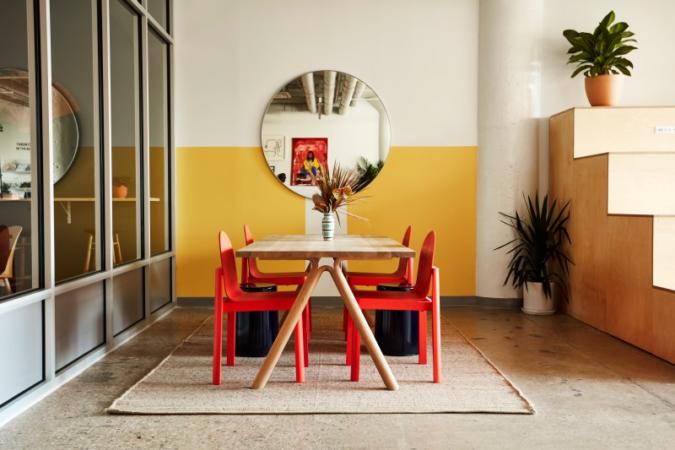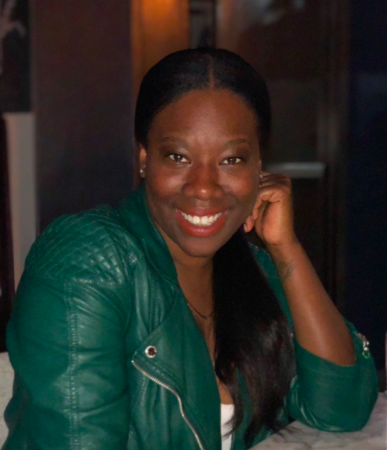The onus to create safe spaces for Black creatives has always been on other Black people. Before the public health crisis, these welcoming locales, where creatives could openly exist and express without the judgment of white gaze — whether virtual or IRL — were precious and rare.
Founded by Naj Austin, Ethel’s Club is one of these sacred centers: a social club where members of the Black community have access to healing through “conversation, wellness and creativity.”
Following the pandemic, Austin pivoted to an all-virtual membership, offering the same much-needed resources and space to her members.
“We understand that lots of people are currently out of work, have no idea if that work will even come back and still need some semblance of peace and space,” she says. “Amid all of that, we started offering free group healing sessions once a month or twice a month to provide for people who, you know, need a space to then talk to someone, meet a therapist, whatever it may be, because the world sort of like fell apart.”
Crystal Hines, the founder of Super, a soon-to-come multidisciplinary workspace in L.A., has also had to remix her business plans to launch a mobile gallery space — a solution to the lack of diversity in the art world.
“During this downtime, we’re focused on navigating our cause in the art world and how to help that young artist who may be discouraged right now and may not be feeling like they have a space to showcase their art,” she says.
AfroTech spoke with both female founders as they work diligently to both expand and launch new ways to keep safe spaces for Black creatives thriving.
Naj Austin

A Change of Plans
Switching to virtual programming was such a no-brainer for us. I remember it so vividly: It was Thursday, March 12, and we had a big event planned that Friday around Black hair. I was stressed and watching the news the entire day as cases kept going up and pretty big institutions continued to shut down. And by two o’clock in the afternoon, my team and I decided to close our clubhouse indefinitely to protect our community. By the next morning, we launched a digital membership that allows members to connect with each other and still attend events that we have curated and created.
Digital Space
I wouldn’t say that we had the hang of it. Look, it was much more like learning how to fly as we’re flying, which is just sort of embedded in startup culture. If it’s built with the right level of intention and clarity, it will all work out. And that’s what happened. When we first went online, we just hosted the events that we already had scheduled in the clubhouse.
Early on, not everyone knew how to use Zoom so it was very chaotic, but we learned very quickly what our members liked, what they didn’t, what they were looking for in terms of programming, and when they wanted it. You can Zoom or House Party, chat on Twitch or Discord, but we want to cut through that and give you one centralized place you can depend on to have good virtual content with the membership.
https://www.instagram.com/p/CBl5nzAp9Da/
A New Economy
What’s important to me is accessibility. It was a very purposeful choice to make our digital clubhouse membership $16.99 a month. We provide space and we provide a place for empowerment and to be seen and heard. But how can we make it so that more people can have access to that? Some of the things we’re thinking about in terms of reopening the clubhouse, whenever that is, is making membership much more accessible, kind of coming away from focusing on these monthly memberships and allowing people to kind of drop in and use and take up space as much as they need, as much as they can afford. If you need space for an hour a week, we’ll figure it out so that our space can be for the most amount of people in the community, and we can still pay the creators who are putting on events and our staff.
Everything in our space is enforced by Black women. Then most of the things you see have been created by a Black person or a person of color. Our electricians, our wood builder, our metal worker, they’re all people of color and or Black. Once you join, you’re contributing to those people. We have three events per day — so that’s three people of color who benefit and are paid fair wages to create in their own likeness. And so once you’re a part of it, a member, you’re like feeding this whole operation. It’s not just “Black-owned;” every single part of this journey is meant to feed the community, providing Black people and people of color jobs where they’re only asked to show up as themselves and nothing more. And so we want to just do that for everybody.
Crystal Hines

Hitting Pause
Super is an extension of Ammo Magazine, an art-based digital platform that I launched in 2007 in New York. Originally, our content was fashion-centric, so we did shoots all the time. Back then, it was a lot harder to find studios that were affordable and Black-owned. And if they were like $20 per hour, then it was a bare-bones studio. You didn’t really have much in there to help you with your shoot, no staff or anything. Plus, there are microaggressions that come with reserving non-Black spaces. The art world in general lacks inclusion so as our content shifted, I noticed that there were some issues with independent Black artists gaining access to gallery spaces and curators. Super birthed from that need: a space that services artists, musicians, and all creatives of color.
We originally planned to kick off a mobile aspect of our workspace, Super Pop-Up, in February and March. We were going to go to Armory Week, SXSW, Coachella, where we set up shop as a place for artists, photographers, influencers, podcasters, and even Black press to be creative, rest, whatever they need. We would also include small-scale programming. That was the plan for 2020—then the pandemic hit.
Plan A
I’ve found it difficult to go virtual because I don’t want to depart from our core mission to help our creative community of color in a physical way. What ends up happening in my mind is that once we set out on this digital path, it’s hard to keep up with, then we return to normal.
Money Matters
Funding this project also posed an issue. It’s a large scale project that needs sponsors, but since everything got canceled because of COVID-19, I stopped asking for funding for the current year. Now, we’re looking ahead. We have an iFundWomen campaign to raise $35,000 for our pop-up initiative in the summer of 2021.
Future Forward
The vision for Super is to have Black people available for our clients’ every need. I trust us and not that I don’t trust any other people, but I trust us. We deserve to be in spaces where we have access to these things without the microaggressions, without feeling like we can’t be the type of artist that we are unapologetically, without gatekeepers in the way of us prospering in that space as well. Super is for us, by us, and with us. There are employees there that look like you and they’re experts in that field that can help you with whatever you need.


